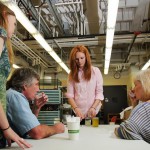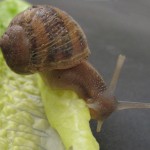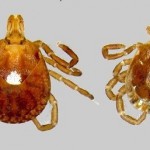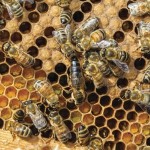Tag Research
Tasty Solution: Better beverages for people who have trouble swallowing
After having a stroke in 2008, Jan Blume lost the ability to swallow for two full years. As she slowly regained that vital function, she faced a new challenge: drinking the thickened beverages that are recommended for people with swallowing problems, or dysphagia. She found the drinks almost intolerable. Read More
Tuberculosis genomes portray secrets of pathogen’s success
By any measure, tuberculosis (TB) is a wildly successful pathogen. It infects as many as two billion people in every corner of the world, with a new infection of a human host estimated to occur every second. Read More
Q&A: Turning fandom into political and social action
As the public's faith in government and traditional political institutions crumbles, younger generations are taking cues from fictional wizards and TV vampires to take action on behalf of issues or causes they believe in. Read More
Discovery of new enzyme could yield better plants for biofuel
For nearly a decade, scientists have thought that they understood how plants produce lignin - a compound that gives plant tissues their structure and sturdiness, but can limit their use as a source of biofuels. Read More
First, fishing. Then, volleyball. Serious fun at Trout Lake Station
Angling for perch at sundown is just one of the perks of Wes Matthews’ summer research job at Trout Lake Station in Wisconsin’s north woods. Another is donning scuba gear and diving for lost equipment. The most important task, though, wouldn’t appeal to everyone. “Basically, I study what fish had for lunch,” says Matthews. Read More
Essential mechanism of symbiosis found in Hawaiian squid
Experiments at the University of Wisconsin–Madison with a small squid that glows in the dark have uncovered a complex conversation that allows the newly hatched squid to attract the glowing, symbiotic bacteria that disguises it against predators. Read More
Children exposed to lead more likely to be suspended from school
Children who are exposed to lead are nearly three times more likely to be suspended from school by the 4th grade than children who are not exposed, according to a new University of Wisconsin–Madison study funded jointly by the Robert Wood Johnson Foundation and the Wisconsin Partnership Program Education and Research Committee. Read More
New gene repair technique promises advances in regenerative medicine
Using human pluripotent stem cells and DNA-cutting protein from meningitis bacteria, researchers from the Morgridge Institute for Research and Northwestern University have created an efficient way to target and repair defective genes. Read More
WID researcher locates “virtual eyes” to enhance 3D experience
3D movies are a popular trend this year, with countless films opting to include features that make viewers feel as though they are a part of the action. But what if 3D technologies in movies were not just a feature, but an entire, encapsulating experience? Read More
Eavesdropping plants prepare to be attacked
In a world full of hungry predators, prey animals must be constantly vigilant to avoid getting eaten. But plants face a particular challenge when it comes to defending themselves. Read More
UW researchers witness new type of cell division, use it to battle cancer
While on their way to finding a means to attack certain types of cancers, the researchers made the first observations of cytofission in humans, a type of cell division that occurs at a different time than normal division. Read More
UW institute announces National Poverty Fellows Program
A new National Poverty Fellows Program, administered at the University of Wisconsin–Madison, will launch a search this fall for talented postdoctoral researchers to participate in a partnership to build capacity to conduct high-quality, policy-relevant research on poverty and inequality in the United States. Read More
Virtue rewarded: Helping others at work makes people happier
Altruists in the workplace are more likely to help fellow employees, be more committed to their work and be less likely to quit, new research by the University of Wisconsin–Madison's La Follette School of Public Affairs shows. And these workplace altruists enjoy a pretty important benefit themselves - they are happier than their fellow employees. Read More
WID conference probes math challenges in optimizing solutions to industry problems
With every flipped light switch, plane takeoff, package delivery and even medical procedure embedded in 21st-century life, there’s a series of decisions that have been optimized to make these actions work the most efficiently. A thriving community is constantly finding the best way to run these systems in order to reduce costs for companies and customers, get the most out of resources, improve medical treatments and to achieve a multitude of desired outcomes. Read More
Exotic lone star tick making a home in Wisconsin
It's shaping up as a summer like no other for ticks across Wisconsin - including the strongest contingent yet of a bloodsucker new to the state. Read More
Hormones may usher abused girls into early adulthood
During the sort of tense situation that makes palms sweat and voices quaver, children and young adults are typically awash in cortisol, a stress hormone that sounds an alarm and prepares the body for fight-or-flight responses to danger. Read More
Seminar explores role of proteins in health and disease
The Human Proteomics Program at UW–Madison and the BioPharmaceutical Technology Center Institute on Aug. 1 will present the Wisconsin Human Proteomics Symposium: Targeted Proteomics and Systems Biology in Health and Disease. Read More
Hackathon links humanities and sciences
Jillian Sayre contends that Herman Melville’s whaling ship Pequod and its encounters with other boats at sea may have toted meaning beyond the characters onboard. Read More
Protecting our Pollinators
Bees, so crucial to our food supply, are dying off at alarming rates. CALS researchers are taking a close look at everything from the microbes in their hives to the landscapes they live in to identify in what conditions bees thrive. Read More
Study puts troubling traits of H7N9 avian flu virus on display
The emerging H7N9 avian influenza virus responsible for at least 37 deaths in China has qualities that could potentially spark a global outbreak of flu, according to a new study published today (July 10, 2013) in the journal Nature. Read More













